You might be wondering, should I let my dog sleep with me?
We thought this would be an interesting topic to discuss, especially for people who have recently adopted a puppy or dog. How do you decide where the pet will sleep?
Hi, Lindsay and Barbara here. Lindsay is the main blogger behind That Mutt, and Barbara writes regularly for That Mutt. She’s also a blogger at K9sOverCoffee.
We both love the idea of our pets sleeping with us, especially in the bed. But our dogs and Lindsay’s cats are way too disruptive. Sleep is important, and with our pets in the bedroom we don’t sleep well.
Our nighttime routine with our pets
Lindsay’s typical routine is to put their cats in the spare bedroom at night. Otherwise, they bother her and her husband. Her dog Ace slept on his dog bed (R.I.P buddy) in the main living area of their apartment where they couldn’t hear him snoring, licking himself, gagging (from licking himself!) or shaking his body and ears around.
Barbara crates her pup Wally at nighttime. His crate used to be in her bedroom, but she moved it into the bonus room and covers the crate with a blanket. That’s the only way to keep him from waking up at dawn and selfishly demanding breakfast in the most annoying way…you know, by whining and barking. F U N…not.
When she didn’t crate him, he’d whine as soon as he woke up and made it a point to wake Barbara up as well. When she crated him without the blanket, he’d STILL whine as soon as he woke up, which had the same result of waking Barbara up (and everyone else who happened to be in the house)! It was pretty annoying.
Dogs in the bed, with permission
We’re not opposed to dogs sleeping in the owner’s bed at night as long as the dog is not possessive of the bed or possessive of the owner. This can be avoided by creating the simple rule that the dog is allowed on the bed only with permission such as “up!”
Reasons to let your dog sleep in your bed
That being said, the following are some reasons to let your dog sleep in your bed with you – do you have any others? Let us know in the comment section below this article!
- Comfort. There’s just something very comforting and soothing about a dog’s warm body snuggled up next to you.
- Emotional support. Dogs are very good at picking up on our emotional state of being. They can be very therapeutic when we’re feeling blue.
- Protection. Lindsay liked the idea of Ace being loose in their apartment at night because he did provide some amount of protection if someone had broken in. She knew Ace would never actually attack or bite anyone, but at least he was a big, black dog with a deep bark. Barbara feels the same way, but Wally’s annoying early morning routine when he’s not crated prevents him from being loose in the house at night. Hopefully that will change at some point.
- Bonding. Sharing the same sleeping quarters definitely helps strengthen the bond between a dog and his human. Barbara still likes to nap on the couch with Wally.
- Guilt from being gone all the time. Some humans are gone so much during the day that the only time they get to spend with their dog is at night.
Barbara’s dog Wally used to be allowed to sleep on her bed at night for reasons one and three, ha! That’s until he started crowding her when her boyfriend spent the night, and the early morning whining wasn’t ideal either.
Obviously, that behavior needed to be addressed and resulted in Wally’s loss of bed privileges. See her article Help – How I got my dog’s jealousy under control! for more information on this topic.
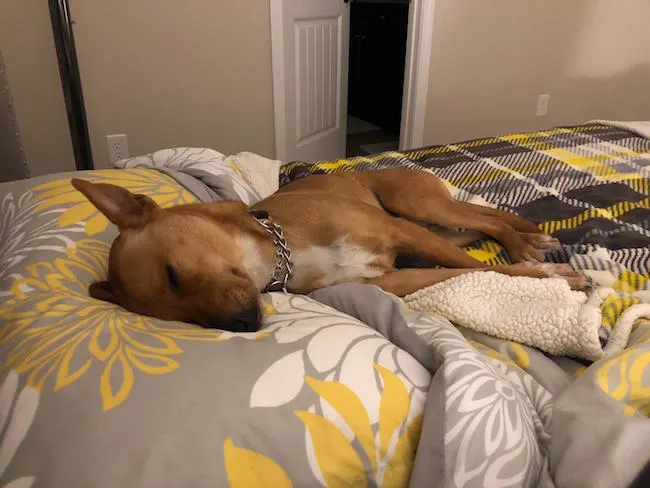
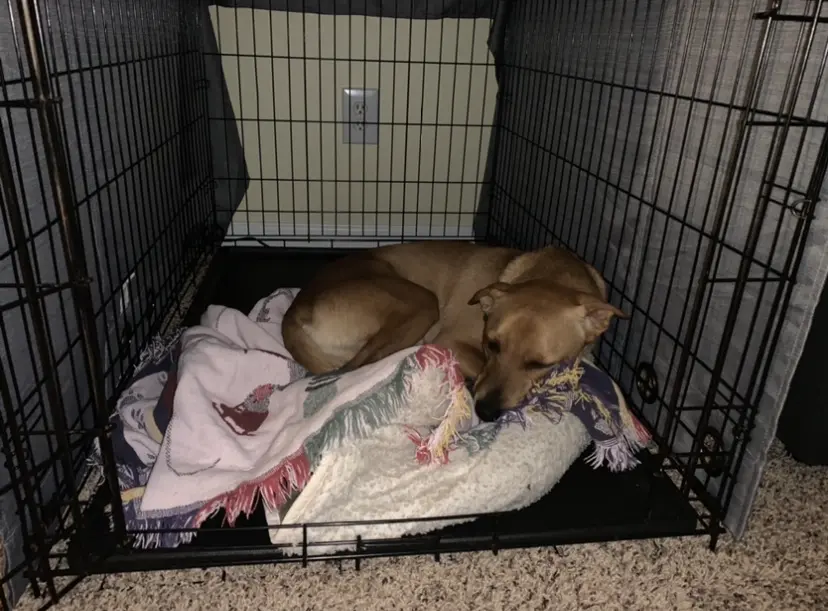
Should I let my dog sleep with me? It’s OK to set rules for your pets
We want to underline that setting rules for your dog is not about being “dominant.” It’s about creating boundaries so we can live peacefully with our dogs.
And if the owner doesn’t want the dog on the bed, that’s OK too! The dog doesn’t get to decide. The human gets to decide.
There’s no way Lindsay and her husband could have let Ace sleep on their bed either. He was an extra gross dog who shed and drooled all the time. On top of that, he always had black, “drool crust” stuck to his jowls, along with fresh drool. He would have ruined their comforter and sheets in about a week if he had slept on their bed. Yuck.
Because of this, they created the “no dogs on the furniture” rule from day one and it worked out well. Ace actually seemed to prefer his dog bed because that was his routine.
See That Mutt’s article How to keep your dog off the furniture for down-to-earth tips on this topic!
Barbara allows her dog on the furniture (couches), but only when they’re covered with doggie blankets. Wally’s a wash-n-go dog with a short coat, but he still sheds quite a bit, hence the blankets. Thankfully he doesn’t drool – except when tasty treats and his raw dog food come out, ha!
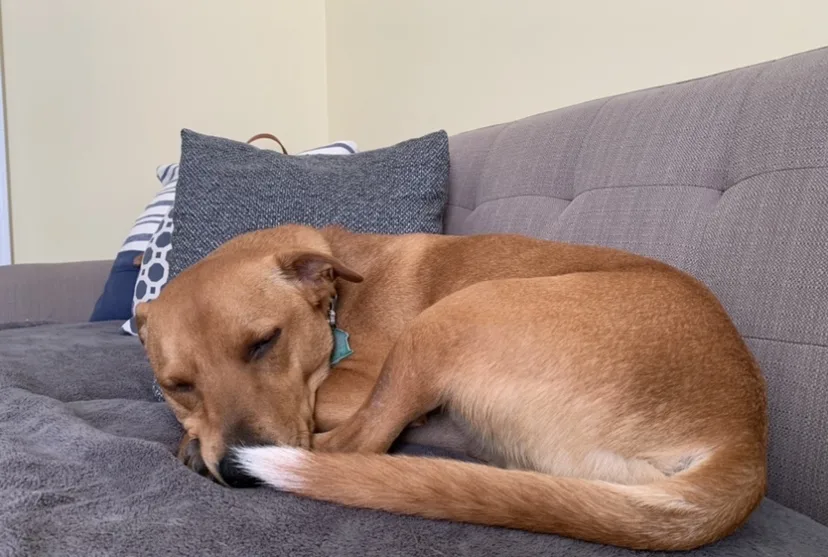
Why is it “bad” to let your dog sleep in your bed
We already touched on a few issues caused by dogs allowed to sleep in our beds, and there’s the potential for more, such as:
Resource guarding
Dogs can be pretty selfish and refuse to move once they’re on the bed. As long as they move when you tell them to and/or guide them off, that’s fine. But it starts to be a serious resource guarding problem when they defend their spot by growling, snarling, and ultimately biting you!
Separation anxiety
The downside of regular, nightly body contact with your dog can be that he becomes insecure when you’re not around, which can result in separation anxiety. Some signs of it are destructive behavior, inappropriate urinating inside, pacing, a tucked tail, and refusal to eat.
Issues with partner or spouse not approving
You and your partner should definitely be on the same side regarding your dog’s behavior. If you’re not, your dog will be confused because of the mixed signals he receives, and YOU will be arguing with your partner about what’s acceptable doggie behavior and what isn’t.
Allergies
This one’s pretty straight forward – some people are physically unable to share their beds with their dogs because of allergies.
Quality sleep is important!
It’s no secret that quality sleep is the key to a healthy life. It helps create a strong immune system, mental and physical fitness, as well as overall happiness. Since dogs have much shorter sleep cycles than we do, they also tend to wake us up more when they’re in bed with us. Not a good combination!
Dogs are gross, haha!
This varies from dog to dog, but some dogs are definitely more gross than others. For example, picture the drooling Mastiff or Bulldog that constantly farts and smells like the dirt he rolls around in. Doesn’t exactly trigger the image of the nicest sleeping partner, right?
Just don’t want a dog in the bed
Of course, some people don’t need a specific reason why they don’t want their dogs in bed with them. They just don’t want to share their sleeping space with an animal, and that’s perfectly acceptable too.
Kennel training
If Lindsay’s dog had been at all destructive at night, she would have had him sleep in his crate. But, he never chewed things, never got into the trash and never had accidents. Because of this, he got to be free at night and when he was home alone.
When Lindsay and her husband got a second pup, Weimaraner Remy, he slept in a crate until they knew he could be trusted in the house. Since Remy was a puppy when he joined them, he slept in his crate for the first six months to form good habits.
Should you let your new puppy sleep with you?
Speaking of puppies, you may wonder what’s the right approach as far as your new puppy’s sleeping routine goes. Is it ok to let your puppy sleep with you? Or would the puppy be better off in a crate and/or a doggie bed?
There’s really no right answer and it depends on your personal preference, but of course there are pros and cons to consider:
Pros
- Bonding with your new puppy
- Sense of security for the puppy
- Avoiding your puppy’s crying at night
See That Mutt’s article How long do puppies cry at night? for more information on this topic. Hint: It doesn’t last forever and can be nipped in the bud with a few tricks!
Cons
- Potential house training issues
- Puppies may accidentally be smothered
- Resource guarding issues (growling when you try to lie down on your own bed)
See That Mutt’s article How to Stop A Dog From Growling At You On The Bed for 9 helpful tips for this issue.
Alternatives
- Crate the puppy right next to your bed.
- Place a soft heartbeat toy into the puppy’s crate or bed to mimic mom’s heartbeat.
- If you decide on a puppy bed instead of a crate, place it on a surface that’s easy to clean such as kitchen or bathroom tile/wood floors. It’ll come in handy in case of nighttime potty accidents. Additionally, gate the sleeping area off to limit your puppy’s roaming attempts at night.
That being said and as we already pointed out throughout this article, we both prefer not to let our dogs sleep in bed with us, and the same goes for puppies. Wally was already a year and a half old when Barbara adopted him, but her previous two dogs came into her life as 8 week old puppies.
Back then, she crated them together so they’d have each other for comfort and snuggling reasons.
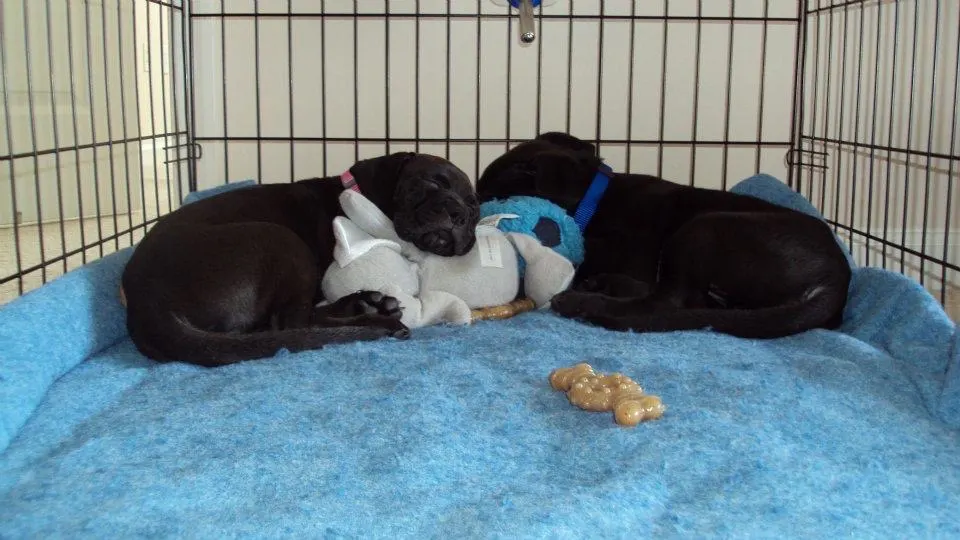
That worked out great until they were about 5 months old. At that point, they had outgrown their initial shared crate and got their own respective ones.
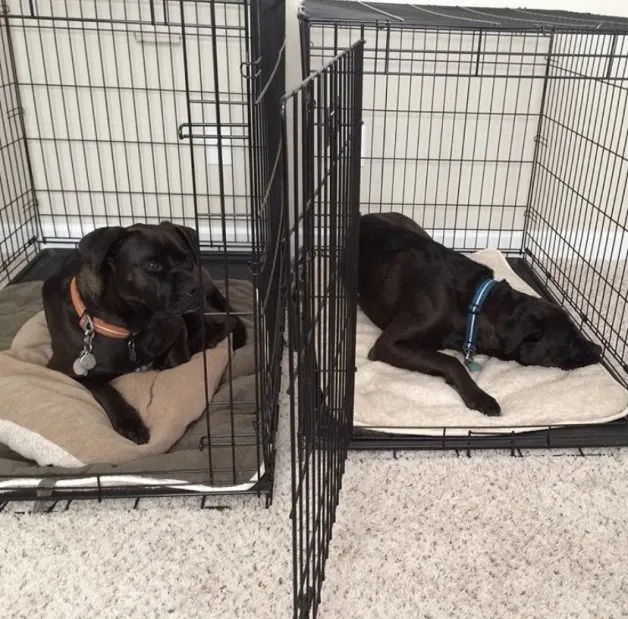
See That Mutt’s article Dog and Puppy crate training for helpful tips about this topic.
Should I let my cat sleep with me?
Lindsay’s cats are another story.
Her cats are/were really naughty. Beamer began meowing (howling!) to eat at about 5:15 a.m. unless he was in his cat carrier (R.I P. Beamer). So, most nights she put him in his carrier, especially on weekends. He didn’t howl in there, so that’s where he slept. Lindsay threw a blanket over it so he couldn’t tell when it was light out, and she left a loud fan on.
Her other cat, Scout, is usually quieter, but if he’s in their bedroom he starts sneezing (yep!) around 5:30 because he wants to eat. And if they close him out of their bedroom he cries on the other side to get in. So … he also has to be closed into the spare bedroom at night, often in his carrier as well.
Many dog owners put their dogs in crates every night, so Lindsay doesn’t feel bad at all that her cats have to go in theirs. She actually gets a fair amount of people who tell her they don’t sleep well at night because of their cats, and she always recommend putting the cats in another room or in their cat carriers. Why wouldn’t you?
So, that’s Lindsay’s routine. About once a week or so, she used to let Scout or Ace sleep in their bedroom and she woke up every hour to Ace licking himself or snoring or Scout stepping on her or walking around on the bed. Then, she was reminded why they’re usually not allowed to sleep with them.
So, what do the rest of you do?
Do you let your dog or cat sleep in your bedroom?

Barbara Rivers writes regularly for That Mutt. She is certified in raw dog food nutrition from Dogs Naturally Magazine and the author of three ebooks about balanced raw dog food. She is a blogger at K9s Over Coffee.




H
Wednesday 30th of August 2023
My dog smells pretty good I think doesn’t wake up unless he needs to go doesn’t demand breakfast and is so furry and warm. I think I’d still sleep with a drooling farting dog but who knows. I think any arrangement is ok. Just not a big fan of locking crates.
Scott
Tuesday 29th of November 2016
Honestly it is one of the great pleasures at the end of the day to cuddle up with one or both of my dogs - Shian who is going blind - he cannot see at all except in bright light - so he wants to be by his human daddy until the light returns - Tohee my fur-girl is just a cuddle monkey but likes to sleep on her own bed - I guess we all need a break from training - and when lights go off - the dogs can sleep on my bed or choose the floor or the sofas - sweet furry dreams....
Laura
Monday 28th of November 2016
Once our puppy was potty trained, we started letting her sleep on the floor, on a blanket, next to our bed. I take off her collar so her shaking doesn't wake us up. After my husband leaves for work, early in the morning, I pick her up and snuggle in bed with her. She rarely bothers me or wakes me up. It's wonderful bonding time. She doesn't beg for it, but she loves it!
Grace
Monday 28th of November 2016
Charlie is my first dog, and he had been in two different homes within the past months before I adopted him. On Charlie's first night with me, I put him in his crate. He whined and cried and wouldn't be quiet. Since I live in an apartment complex, I was afraid that my neighbors would hear him. So I placed the crate on top of my bed, next to me. Of course this didn't work either! So after about 30 minutes I let him out and he promptly lay down next to me and was quiet. He's been on the bed ever since! As long as he stays on 'his' side or between his pillows, I'm fine with it!
Paul
Monday 28th of November 2016
When we got Blue from the Humane Society, we actually encouraged him to sleep with us. It helped with bonding and he is such a gentle pup. When Stella came into our lives as a puppy, it was ok but she has some licking and sprawling habits when we go to bed. As she got older (and bigger) we were running out of room. At that point we put up a baby gate so they have run of the house at night except for the bedroom. We would still allow them to sleep with us on "special" occasions. At first, Stella would sit outside of the baby gate and whine, but over time she has gotten used to it.
The main reasons for cutting down their bed times was Stella's nighttime antics, the fact that we were washing our bed sheets every couple days because they couldn't help but track in some dirt sometimes (Blue is a digger), and the topper was when I got Lyme Disease earlier this year. We have made some adjustments and the pups have also adjusted well. It helps that Stella is now about 2-1/2 so she's getting to the end of her "puppy stages". They both have acclimated well to sleeping together on the love seat or in the dog bed. And, yes, we do still have the "special" occasions sometimes. Not often, but they consider it a treat to be allowed to sleep there.